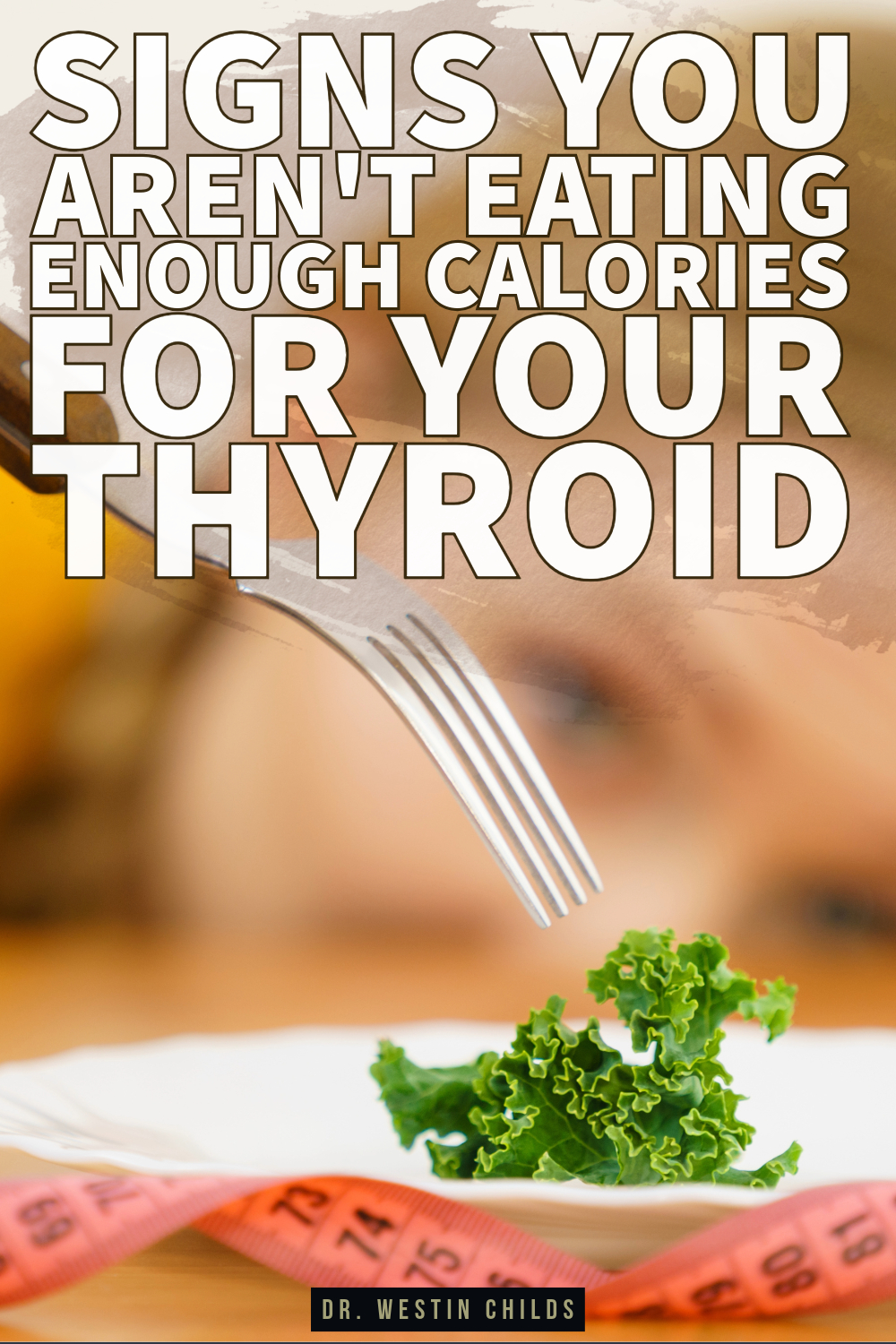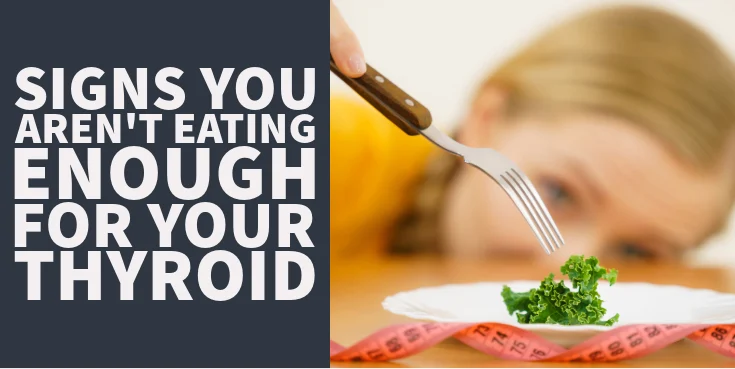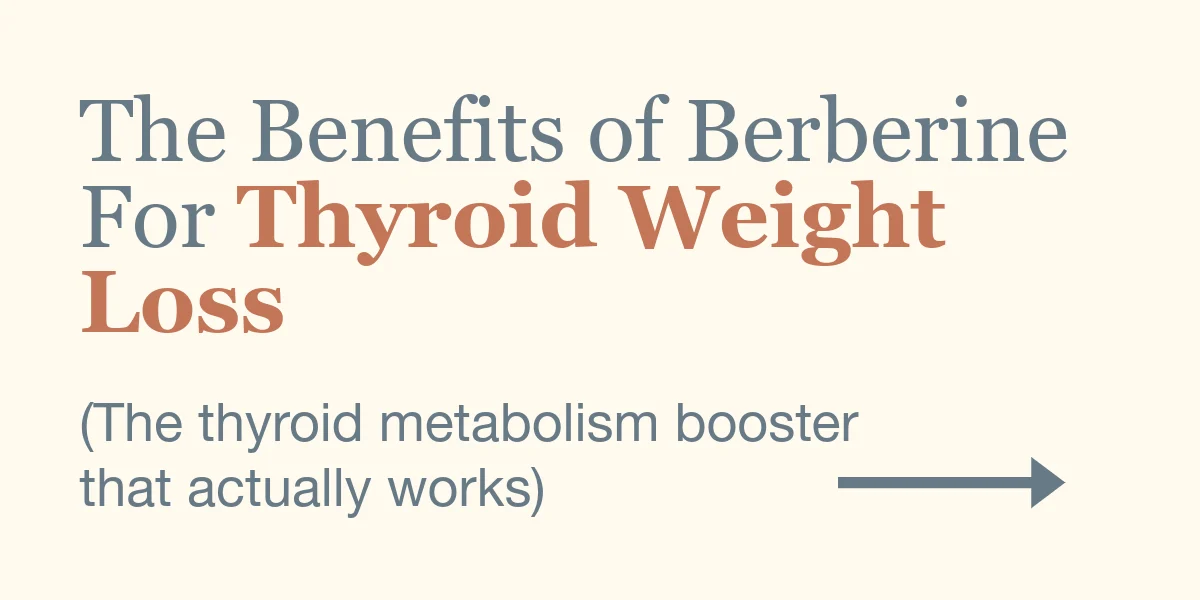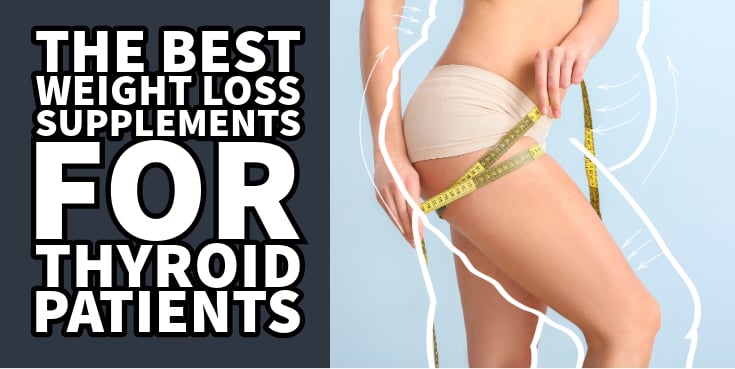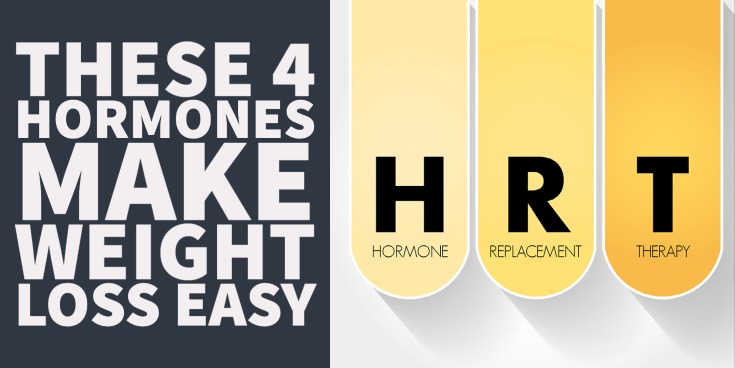Did you know that not eating enough can cause damage to your thyroid?
In the most counterintuitive way possible, undereating can actually make your thyroid worse which will only serve to make your weight loss efforts more difficult in the long run.
This happens because your thyroid is responsible for a huge portion of your metabolism (roughly 50-60%).
And if you lower thyroid function, you will slow down your metabolism in the process.
So if you are someone who wants to lose weight or even maintain your weight then you must pay attention to your thyroid.
The good news is that your body will give you signals if you aren’t eating enough, you just have to know what to look for which is exactly what we are going to talk about right now:
Sign #1. Your weight keeps climbing even after reducing your calories
This is a difficult symptom for many people to understand.
How can you possibly gain weight if you are eating only 1,000 calories per day?
Is that even possible?
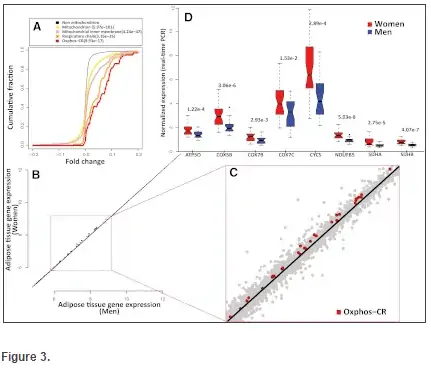
It is absolutely possible and it is something that I see all the time.
The amount of calories that you burn each day is largely dependent on something known as your basal metabolic rate.
Your “metabolism” is another name for your basal metabolic rate and this number is responsible for the majority of energy that you burn in the day.
In fact, this number represents around 70% of ALL calories that you burn each day.
Compare this to exercising which may only account for 5-20% of the calories that you burn in a day (depending on how aggressively you exercise).
Just looking at the numbers it’s easy to see why your focus should be on your metabolism and NOT on how much you exercise.
Even if you were able to double the number of calories that you burn with exercise you would only be doubling a small number (a few hundred calories).
If you focus on increasing your basal metabolic rate even 10-20% you will have made a much bigger impact on your energy expenditure and thus your ability to lose weight.
If you are gaining weight despite eating a low-calorie diet then it’s VERY likely that you are suffering from metabolic damage or a damaged metabolism.
The answer to this problem is not to continue to restrict your calories.
Instead, you have to take a systematic approach to slowly increase your calories to improve your basal metabolic rate and reverse hormone damage that may accompany metabolic damage in your body.
Sign #2. You feel cold all of the time
Many people who are not eating enough calories also suffer from changes to their body temperature.
Studies have shown that there is a correlation between the amount of heat that your body produces and the number of calories (4) that you burn in a day (your metabolism).
Your body creates heat by burning energy and that energy is released as heat.
People who have a damaged metabolism often notice that their body temperature is lower than normal.

Instead of a body temperature around 98.6 degrees, they may be 1 to 2 degrees lower than that at rest.
In addition, these patients also suffer from symptoms such as cold hands, cold feed, or cold intolerance.
These people often wear socks to bed and/or they can be found in a sweater in the summer.
This reduction in body temperature is due to a combination of reasons, but certainly, a reduction in thyroid conversion is certainly to blame.
Studies have shown that caloric restriction causes a reduction in peripheral thyroid conversion (5) and an increase in an antithyroid metabolite known as reverse T3.
This increase in reverse T3 helps put on the “brakes” to your metabolism which also causes a reduction in energy production.
Sign #3. You are constantly fatigued
If your body isn’t producing enough energy (outlined above) another symptom will be the subjective sense of having low energy or being fatigued.
The “energy” that your body produces largely occurs in the mitochondria and it is pumped out in a molecule known as ATP or adenosine triphosphate.
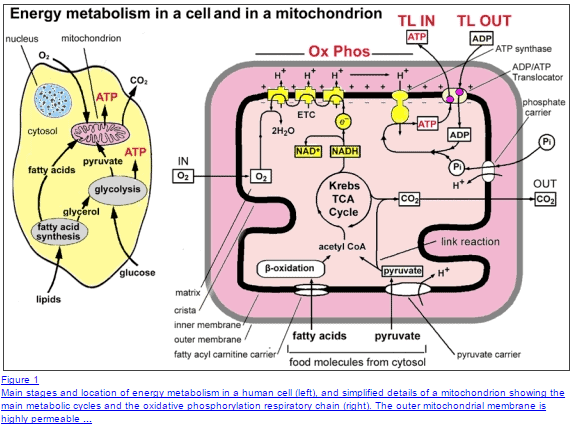
It’s helpful to think of your mitochondria as a machine with varying degrees of efficiency.
As you reduce the number of calories that you consume your body will send signals to your mitochondria to reduce the efficiency (6) and production of energy from the cell.
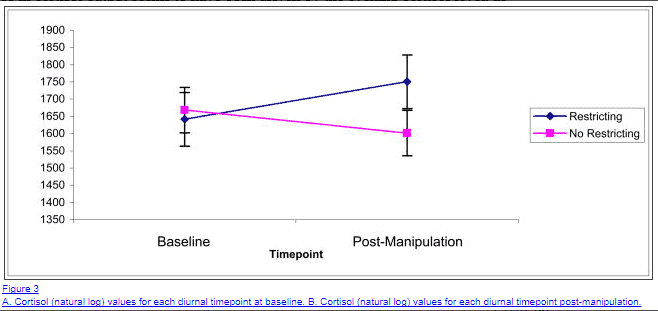
A reduction in even 5-10% of energy production may result in severe symptoms body-wide as your mitochondria slow down energy production.
You can “rev” back up the engine by providing certain cofactors involved in mitochondrial energy production like the B vitamins.
This may explain why people suffering from low energy tend to respond to B vitamins.
Sign #4. Your Hair is falling out
Another indication that you are not eating enough is that your hair is changing (and not for the better).
Hair changes may include any of the following:
- Overt hair loss
- Changes to hair texture or thickness
- Thinning hair
- Receding hairline or male patterned baldness
- Split ends or damaged hair shafts
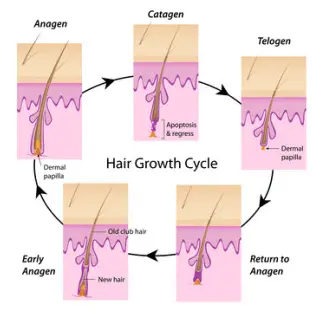
Hair loss is a known side effect of rapid weight loss.
The hair loss seen with weight loss and calorie restriction is due to a variety of factors.
First:
Hair loss may be exacerbated by nutritional deficiencies (7) such as zinc, iron, selenium, and fatty acids from dieting itself.
Second:
Hair loss may be caused by a reduction in peripheral thyroid hormone conversion (8) and low circulating T3 levels seen in calorie restriction.
Hair loss is a known side effect of hypothyroidism.
Third:
Calorie restriction is a stressful situation that causes changes to cortisol levels in the body.
Stress and changes to cortisol levels (9) are well known to cause hair loss.
If you suffer from hair loss it’s important to realize that this is NOT a normal condition or side effect.
Hair loss can be used as a sensitive marker for hormone imbalance (thyroid dysfunction), metabolic damage, and nutrient deficiencies.
If you suffer from hair loss make sure you are evaluated for all of these conditions and make sure you consider the use of highly targeted supplementation.
Sign #5. You are irritable, depressed, or otherwise not feeling like yourself
When you aren’t eating enough calories you will notice slight and subtle (ok, maybe not so subtle) changes to your mood (10).
People who suffer from metabolic damage notice that they are highly irritable and often depressed.
Studies have also linked depression to changes in appetite, cravings, and food intake.
Why this occurs isn’t completely understood but likely has to do with changes to neurotransmitters from the gut (serotonin), changes to hormones in the body (thyroid), and changes to blood sugar levels.
People who suffer from this condition will notice that their mood changes rapidly once they start eating again.
If you are suffering from mood changes related to food intake then the number of calories you consume may be part of the problem.
Sign #6. You suffer from dizziness or lightheadedness
These symptoms are related to the autonomic nervous system.
This system is primarily mediated by a neurotransmitter known as norepinephrine (or noradrenaline).
This system is under unconscious control and is responsible for adjusting very important systems in your body such as your heart rate, metabolic rate, and control over smooth muscles.
Calorie restriction causes problems with this system (11) which may lead to lower than normal resting heart rate even if you aren’t a conditioned athlete.
It may also cause dysfunction leading to the inability of your heart to adequately respond to exercise.
This may manifest as symptoms such as dizziness, lightheadedness, or the inability to tolerate exercise.
Other symptoms may include feeling dizzy upon standing.
This particular set of symptoms occurs in about 50-60% of patients consuming too few calories.
Sign #7. You are having trouble falling asleep or staying asleep
Lastly, you may notice that you are having issues either falling asleep or staying asleep.
This problem is related to a combination of stress and changes to your circadian rhythm.
Your circadian rhythm is a cycle that helps to regulate processes in your body such as your sleep-wake cycle (12) as well as hormone changes throughout the day.
Humans evolved with these systems in place and even small changes to these cycles may result in big symptoms.
People who suffer from these symptoms often have a “surge” of energy at night making sleep difficult.
They also may notice changes to their heart rate such as heart palpitations that wake them up in the middle of the night or prevent them from falling asleep.
These symptoms indicate an issue with the normal regulatory circadian rhythm.
Healing your Metabolism
If you have 3 or more of the following symptoms listed above then there is a high chance that you are not consuming enough calories.
Knowing you are not eating enough calories is good to know, but it’s more important to make sure that you do something about it.
Most people who are not eating enough calories do so because they notice that it is the only way to maintain their current weight.
They know that if they consume more calories they will likely gain some weight.
And, unfortunately, this may be required in order to get your metabolism back to normal.
Fortunately, this weight will eventually be lost again – but it may take some time.
The worst thing you can do is continue to keep your calories low and cause further damage.
It’s far better to regain a small amount of weight and fix the root of the problem so that you can lose weight long-term later.
#1. Eat enough calories
Part of healing your metabolism will include consuming enough calories to match your existing metabolic rate.
So how do you do this?
Assuming you don’t have hormone imbalances that alter your appetite such as leptin resistance, it’s actually quite easy.
When determining how many calories to consume you want to focus less on your body weight and more on your symptoms.
By symptoms, I am referring to the combination of your energy levels and your appetite.
Your body (again, assuming you don’t have issues with appetite from hormone imbalances) will naturally try to match your appetite to the number of calories that it needs.
If you suffer from metabolic damage you may find that your body only wants 1,200 calories per day and that’s okay to start.
Over time you will notice that your appetite will slowly increase and this is a good thing as it indicates your metabolism is improving.
You will know if you aren’t eating enough because you will have the symptoms listed above and you will also suffer from food cravings.
#2. Eat enough carbs
The next step is to make sure that you are consuming enough carbohydrates.
People under significant stress and those with thyroid issues may need higher than normal carbohydrates for a short period of time.
The reason is that carbohydrates (from healthy sources) help to improve cellular thyroid function and cellular cortisol function.
They also increase energy production (13) which may alleviate the symptoms of fatigue that patients who aren’t eating enough calories often experience.
You need to make sure you get these carbs from healthy sources so if you decide to increase your carbs use these sources:
- Organic fruits
- Starches such as potatoes and sweet potatoes
- Orange juice
- Dates
- Lactose from dairy if you tolerate it
These sources of carbs work best for people with low energy. The amount that you will need to consume depends on the amount of metabolic damage that you have.
The length of treatment also depends on these same factors.
Some temporary weight gain may be seen while increasing carbs, but it will be necessary to heal your metabolism long-term.
Avoid these sources of carbs:
- Bread
- Pastas
- Rice
- Flour
These carbs will result in increased insulin levels which will exacerbate cortisol levels and may cause weight gain.
#3. Take the right supplements
You should consider the use of targeted supplements to help normalize hormonal systems in your body.
Which supplements you use will largely depend on which problems you are suffering from.
Below I’ve included a list of supplements targeted to specific hormonal conditions that tend to accompany metabolic damage:
- Supplements to boost thyroid function.
- Supplements to improve cortisol function and reduce stress.
- Supplements to boost weight loss.
Click on the links for a more in-depth explanation.
#4. Check your hormones
Lastly, you will want to be evaluated for co-existing hormone imbalances.
Depending on the severity of metabolic damage that you are suffering from you may need to be aggressive in your treatment of these imbalances.
The best way to target your treatment is to first identify the presence of these imbalances and then create a treatment plan if necessary.
If you have known metabolic damage (meaning you have damaged your metabolism from eating too few calories) then I recommend you evaluate the following serum hormone levels:
- Leptin (14)
- Insulin (15)
- Cortisol (16)
- Sex hormones such as estrogen, progesterone, and testosterone (17)
- Thyroid function (entire panel) (18)
Treatment will depend on which hormone imbalances you have.
Back to you
The bottom line?
Not eating enough calories may paradoxically contribute to weight loss resistance and make weight loss impossible long term.
This largely has to do with systems that adapt to caloric restriction long term which results in a decrease in basal metabolic rate.
To find out if you are not eating enough calories you can easily assess your symptoms clinically.
If you have 3 or more of the symptoms outlined above then it is likely you are not consuming enough calories.
Treating this problem may result in temporary weight gain, but improving your metabolism will be required for long-term weight loss.
Now it’s your turn:
Are you eating enough calories? Are you suffering from the symptoms listed above?
Tell your story or leave a comment below!
Scientific References
#1. https://www.ncbi.nlm.nih.gov/pubmed/27136388
#2. https://www.ncbi.nlm.nih.gov/pubmed/18198305
#3. https://www.ncbi.nlm.nih.gov/pubmed/2204100
#4. https://www.ncbi.nlm.nih.gov/pubmed/20969980
#5. https://www.ncbi.nlm.nih.gov/pubmed/1249190
#6. https://www.ncbi.nlm.nih.gov/pmc/articles/PMC2895000/
#7. https://www.ncbi.nlm.nih.gov/pmc/articles/PMC5315033/
#8. https://www.ncbi.nlm.nih.gov/pmc/articles/PMC3746228/
#9. https://www.ncbi.nlm.nih.gov/pmc/articles/PMC3963409/
#10. https://www.ncbi.nlm.nih.gov/pmc/articles/PMC2712828/
#11. https://www.ncbi.nlm.nih.gov/pmc/articles/PMC3696577/#S7title
#12. https://www.ncbi.nlm.nih.gov/pmc/articles/PMC3499064/
#13. https://www.ncbi.nlm.nih.gov/pubmed/1561511
#14. https://www.ncbi.nlm.nih.gov/pmc/articles/PMC2967652/
#15. https://www.ncbi.nlm.nih.gov/pmc/articles/PMC4038351/
#16. https://www.ncbi.nlm.nih.gov/pubmed/27345309
#17. https://www.ncbi.nlm.nih.gov/pmc/articles/PMC3635052/
#18. https://www.ncbi.nlm.nih.gov/pmc/articles/PMC3608008/
